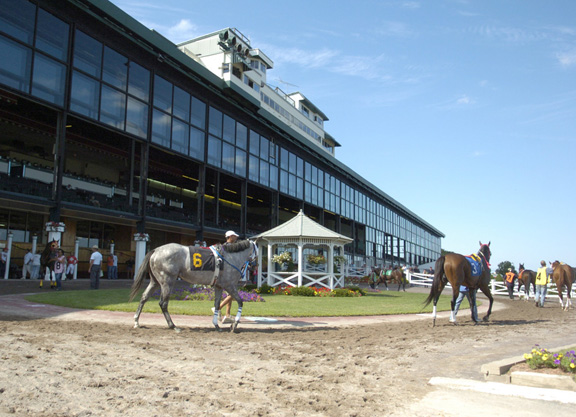By Bill Finley
In and around Boston they're talking only about a 30-day meet in 2018 and one that would take place at a shuttered greyhound track. The purses will likely be relatively modest and there's no reason to believe the stakes calendar will include much of anything that is important. Whatever may come of the future of New England racing, it's not going to be Saratoga, it's not even going be Laurel or Parx. But it will be important.
When the story broke earlier this week that the Stronach Group was looking into operating a short meet in 2018 at the former Greyhound track in Raynham, Massachusetts, the news should have been cheered beyond the Bay State. Not only does New England have a rich racing history, it represents a large segment of the country. The sport can't afford to disappear altogether in New England or, for that matter, any major market where it is legal. If there's never again going to be any live racing in New England, horse racing can forget about ever again cultivating fans from a region that includes roughly 14.4 million people.
There's something to be said about ADWs, simulcast outlets and racing coverage on television, but nothing is more effective in terms of creating a fan of the sport than the live, on-track experience.
Some history: New England was once a hotbed of racing. In its heyday, there were tracks in Massachusetts (Suffolk plus numerous fair meets), New Hampshire (Rockingham), Rhode Island (Lincoln Downs and Narragansett), Vermont (Green Mountain) and Maine (Scarborough Downs). And it was better than you might have thought. Dr. Fager and Roman Brother were winners of the New Hampshire Sweepstakes at Rockingham and the 1937 meet there included a showdown for the jockey title between Eddie Arcaro and Johnny Longden. The Mass 'Cap at Suffolk Downs has been won by Seabiscuit, Whirlaway, Stymie, Riva Ridge and Cigar. At Narragansett, Alsab beat Whirlaway by a nose in a match race in 1942.
Due to numerous reasons, New England racing started to fall apart in the seventies and never found a way to regroup. Finally, all that was left was Suffolk Downs, but it was hanging on for dear life as owner Richard Fields kept it alive only in the hopes that his doing so would lead to a casino license. The casino bid died in 2014 and Fields sold the track to a developer earlier this year. They'll run six days there this year and another short meet is being planned for next year. But that will likely be that. After the last horses cross the wire in 2018, the bulldozers will move in and the track that opened in 1935 will become a Walmart, or whatever they have planned for it.
I didn't become a racing fan in Boston, but I wouldn't be the racing fan I am today if I hadn't spent some formative years there. After growing up first in Philadelphia and then in Central New Jersey, I had spent plenty of time at Garden State, Keystone (now Parx) and Monmouth, but my love affair for the game did not blossom until I reached college at Tufts University and began spending as much time at Suffolk Downs as I did in the classroom. I realize this particular brand of racing and this particular type of track isn't for everyone, but I loved the grittiness of Suffolk Downs, its horses and its fans. We cheered when local heroes like Rise Jim, Mom's Command and Timely Writer won graded races out of town, we jeered as only cynical New Englanders can when a jockey blew it on a 2-5 shot and we put up with attending racing in the most miserable conditions possible in February. We watched when a young jockey named Tim Ritvo emerged in 1983, making his debut at the Northampton Fair and the Great Barrington Fair before moving on to the “big time” at Suffolk.
It is that very same Tim Ritvo who, 34 years later is the COO for the Stronach Group, which is spearheading the effort to revitalize racing in Boston. To its credit, the Stronach Group thinks about more than the bottom line when making business decisions about the sport. Running a short Thoroughbred meet at an old dog track in an area where racing is on the verge of going extinct may not exactly be the best business decision. But I imagine Ritvo might be pushing for this a little harder because he, himself, is a Boston guy, with the accent and all, and knows the passion the people in the region have always had for horse racing. There's a lot of people up there who love the sport. I think he thinks they'll support horse racing at Raynham more than outsiders could possibly imagine.
Ritvo has joined forces with Raynham owner George Carney and has asked the state's gambling commission and politicians to give the Stronach Group some concessions that would help the new track succeed. If they get what they want, the Stronach team and Carney will look to convert Raynham, which is south of Boston near the Rhode Island-Massachusetts border, into a feasible facility for horse racing. All of which means racing in New England will not become extinct after all.
Horse racing needs a presence not just in Los Angeles, New York and Kentucky. It would be great if it were an important part of the fabric of every major city in the country. That's not going to happen. For now, be happy that it looks like it has a future in New England.
Not a subscriber? Click here to sign up for the daily PDF or alerts.






